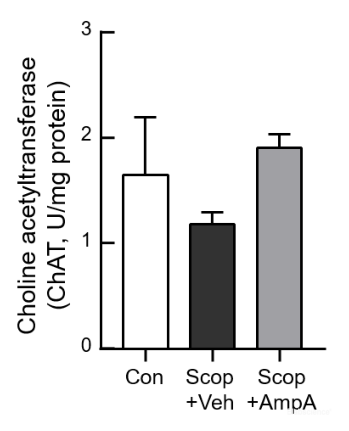Choline Acetyltransferase (ChAT) Activity Assay Kit (Tissue Samples)
SKU: E-BC-K125-M-500
Choline Acetyltransferase (ChAT) Activity Assay Kit (Tissue Samples)
| SKU # | E-BC-K125-M |
| Detection Instrument | Microplate reader (324 nm) |
| Detection Method | Colorimetric method |
Product Details
Properties
| Synonyms | ChAT |
| Sample Type | Animal tissue |
| Sensitivity | 1.21 U/g fresh weigh |
| Detection Range | 1.21-40 U/g fresh we |
| Detection Method | Colorimetric method |
| Assay type | Enzyme Activity |
| Assay time | 65 min |
| Precision | Average inter-assay CV: 9.400% | Average intra-assay CV: 5.100% |
| Other instruments required | Test tube, Centrifuge, 100℃ Water bath, Incubator. |
| Other reagents required | Normal saline (0.9% NaCl), PBS (0.01 M, pH 7.4) |
| Storage | Reagent 2, Reagent 3, Reagent 6: -20℃; Others: 2-8℃ |
| Valid period | 12 months |
Images
Y Hong et al investigate the mechanism of ampelopsin A in ameliorating cognitive and memory function. Choline Acetyltransferase (ChAT) activity of mouse hippocampus was determined using ChAT activity assay kit (E-BC-K125-M).

The activity of ChAT was reduced by the scopolamine injection, and recovered in Scop+AmpA group.
Dilution of Sample
It is recommended to take 2~3 samples with expected large difference to do pre-experiment before formal experiment and dilute the sample according to the result of the pre-experiment and the detection range (1.21-40 U/g fresh weight).
The recommended dilution factor for different samples is as follows (for reference only):
| Sample type | Dilution factor |
| 20% Mouse brain tissue homogenate | 1-2 |
| 20% Rat heart tissue homogenate | 1 |
| 20% Rat liver tissue homogenate | 1 |
| 20% Mouse kidney tissue homogenate | 1 |
| 20% Rat lung tissue homogenate | 1 |
Note: The diluent is normal saline (0.9% NaCl) or PBS (0.01 M, pH 7.4).
Detection Principle
Acetyl-CoA can react with choline under the catalysis of choline acetyltransferase (ChAT) to produce coenzyme A (CoA), CoA can combine with the 4, 4-dithiopyridine. The activity of ChAT can be calculated indirectly by measuring the OD value at 324 nm.
Kit Components & Storage
| Item | Component | Size 1(48 T) | Size 2(96 T) | Storage |
| Reagent 1 | Buffer Solution | 13 mL ×1 vial | 26 mL ×1 vial | 2-8°C, 12 months |
| Reagent 2 | Inhibitor | 1.2 mL ×1 vial | 1.2 mL ×1 vial | -20°C, 12 months |
| Reagent 3 | Substrate A | Powder ×1 vial | Powder ×1 vial | -20°C, 12 months |
| Reagent 4 | Substrate B | 1.2 mL ×1 vial | 1.2 mL ×2 vials | 2-8°C, 12 months |
| Reagent 5 | Accelerant A | 3 mL ×1 vial | 3 mL ×1 vial | 2-8°C, 12 months |
| Reagent 6 | Accelerant B | 1.2 mL ×1 vial | 1.2 mL ×2 vials | -20°C, 12 months |
| Reagent 7 | Chromogenic Agent | 2 mL ×1 vial | 2 mL ×1 vial | 2-8°C, 12 months |
| UV Microplate | 96 wells | No requirement | ||
| Plate Sealer | 2 pieces | |||
Note: The reagents must be stored strictly according to the preservation conditions in the above table. The reagents in different kits cannot be mixed with each other. For a small volume of reagents, please centrifuge before use, so as not to obtain sufficient amount of reagents
Technical Data:
Parameter:
Intra-assay Precision
Three mouse brain tissue samples were assayed in replicates of 20 to determine precision within an assay. (CV = Coefficient of Variation)
| Parameters | Sample 1 | Sample 2 | Sample 3 |
| Mean (U/g fresh weight) | 2.50 | 18.40 | 34.50 |
| %CV | 5.2 | 5.2 | 4.9 |
Inter-assay Precision
Three mouse brain tissue samples were assayed 20 times in duplicate by three operators to determine precision between assays.
| Parameters | Sample 1 | Sample 2 | Sample 3 |
| Mean (U/g fresh weight) | 2.50 | 18.40 | 34.50 |
| %CV | 9.5 | 9.4 | 9.3 |
Sensitivity
The analytical sensitivity of the assay is 1.21 U/g fresh weight. This was determined by adding two standard deviations to the mean O.D. obtained when the zero standard was assayed 20 times, and calculating the corresponding concentration.



